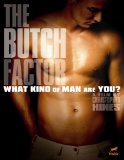| Reviews & Columns |
|
Reviews DVD TV on DVD Blu-ray 4K UHD International DVDs In Theaters Reviews by Studio Video Games Features Collector Series DVDs Easter Egg Database Interviews DVD Talk Radio Feature Articles Columns Anime Talk DVD Savant Horror DVDs The M.O.D. Squad Art House HD Talk Silent DVD
|
DVD Talk Forum |
|
|
| Resources |
|
DVD Price Search Customer Service #'s RCE Info Links |
|
Columns
|
|
|
Butch Factor, The
I think 'masculine' is in the mind of whoever possesses it.
I would describe 'masculine' as a very safe, secure energy."
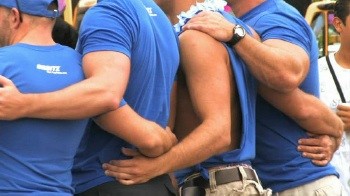
The Movie
Nearly nine years ago when I was leaving my apartment for work, the valediction I uttered to my friend apparently wasn't masculine enough for him. While sitting on my couch--during a hellacious period in which he was living rent free with me as he "got back on his feet"--he looked up at me and said, "Be a man, Cameron." It was one of many red flags I received during our unhealthy friendship, and an odd attack on my manhood that seemed random, misplaced and mean-spirited. Did I not say goodbye loud enough? Did I use girly words? Did I come across weak? Did I want to strangle him then and there? (Only one question is answered affirmatively...)
Imagine my indescribable delight when--less than 10 days later!--I received a phone call from my distraught, freeloading roomie, who was fretting over a flat tire that he had no idea how to fix. I headed home and proceeded to change the tire on his car all by myself as he watched helplessly, apparently oblivious to the colossal irony. Those two incidents are permanently tattooed to my brain, and I couldn't help but relive them while watching The Butch Factor--a documentary that has played a few festivals and will run on the Logo network later this year.
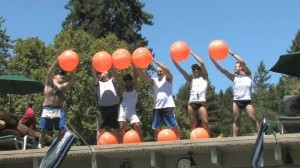

My personal experience not only signaled the trappings of a co-dependent relationship, it spoke volumes about bigger issues facing the gay community. And what has become painfully obvious over the years is that gay men are not only subject to labeling from the straight world, they face the same problems in their own ranks. What Butch attempts to do in 76 minutes is question our perception of masculinity and shatter stereotypes by profiling a range of men who share their experiences coming out and finding an identity--with an emphasis on showing viewers that not all homosexuals are "obvious".
I wish it wasn't necessary--it's 2010, after all. Don't most of us realize that gays are lurking everywhere, including heterosexual havens like the gym, the football field, the trucking world, the rodeo and in law enforcement? Don't we all realize by now that gay men come in a wide range of forms, just like straight men? But once you hear these men talk, it becomes clear that they are sharing important, necessary stories that--if nothing else--will make the path easier for the next generation. Anything that strips away the fear, anxiety and self-image problems that plague so many young men is a good thing, and this collection of interviews from everyday guys--and including historians, authors and professors--is a fascinating watch even if it's a little glossy.
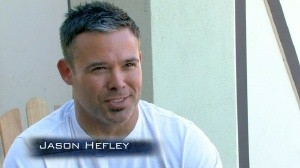
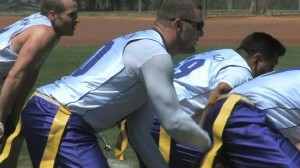
What does it mean to be gay and be a man? What is "masculinity"? Butch opens with some voiceovers that pose intriguing thoughts:
- "With a gay man, masculinity is a feature that they actually think about more often than straight men because straight men are just basically following a line."
- "Homosexual men have a very conflicted relationship with masculinity. They put it up on a pedestal, and on another side they're afraid other men are gonna make fun of them...and they will."
- "Masculinity has to be a special challenge for gay men because we are attracted to other men...so the question of what makes a man a man--and how I can be the thing that I desire--is a central question about who we are as people."
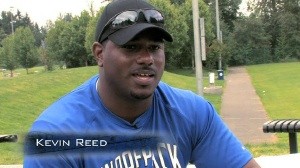
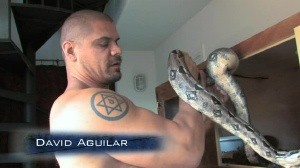
The film introduces us to a group of men who share their stories. Jason--a former high school and college football standout--works at a construction company and plays in a flag football league; Vincent is a lieutenant working in the deputy sheriff's office in San Francisco; Kevin plays in a softball league and has already faced stereotyping for being black; Bill, who grew up thinking that "being gay meant you were a pussy," plays in a rugby league; Wes is a teamster/truck driver in the film industry; and David is a fitness guru with a love of snakes.
The common thread among most of them is that they could pass for straight if they wanted to ("I never would have known!" one friend tells Wes), yet they grew up feeling alone and isolated from both the straight and gay worlds, with no role models to help make their coming-out process easier: "I was finding in the gay community...girl talk, pop culture, Madonna, high fashion," says Jason. "I found myself at times just being a sedentary participant." He found a home in the football league, where he met more men like himself. The experience helped him come to terms with his own identity--and made him realize he wasn't as strong and confident as he thought.
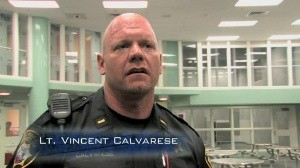
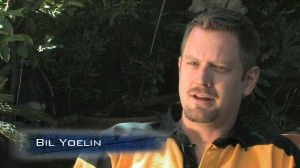
Vincent talks about his experiences coming out the hard way--while working alongside hardened criminals who initially taunted him. He was frightened when he initially worked at the jail, and also feared he would never be accepted by his police peers. "Sometimes I think there's this feeling that because you are gay, that somehow you're 'less than'. And that could just be pre-conceived, something that I carry with myself. But at the same time, I do work with individuals that at times feel that because they're heterosexual and because I'm homosexual, somehow they're better than I am." His story is one of the film's most interesting, and he provides one of the many definitions of masculinity: "A man is someone who looks at adversity straight in the face, and faces it head-on with courage and fortitude. Masculinity resides in here," he says, pointing to his heart.
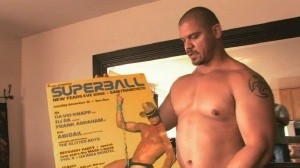
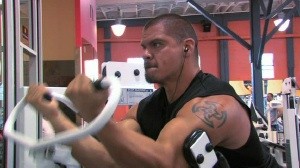
Kevin's story is one of the more touching ones--he still hasn't reached a point of comfort with himself or his friends and family: "It's till kind of rough on me right now...I'm still dealing with it, but this kind of stuff helps." On the other end is Bill, whose involvement with rugby made him a new man: "It's important for young gay guys to have that place where there's camaraderie without it being about body image or dancing." Bill notes he had to get over his own "hetero-phobia" when he joined the league: "I assumed the worst of a lot of these guys." But some interviews with the league's straight guys prove his fears were unfounded, providing a refreshing outlook that is hopefully the sign of wider acceptance throughout society (I wish the film spent more time talking to the straight men on the periphery of these stories; it's a fascinating listen).
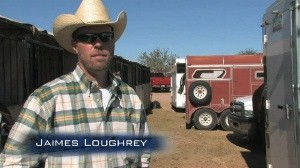
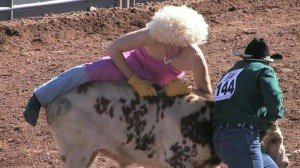
Butch also spends a long segment at the ranch, where we get a peek at gay rodeo (a true blending of drastically different cultures) and meet a real-life Brokeback Mountain story in the form of cowboys Jaimes and longtime partner Matt. We also meet Steven, who will be familiar to fans of reality show Big Brother: "People think that a gay couldn't ride a bull or ride a bucking horse, and what they don't realize is that I'm just as much of a man as a straight man is...but there's a difference I think between masculinity and being tough. I think you can be very masculine and not be tough, and I think a lot of these what you might call effeminate guys that are rodeoing--they may be very effeminate, but they're tough."
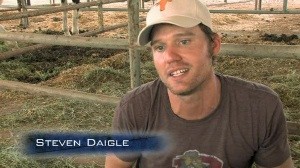
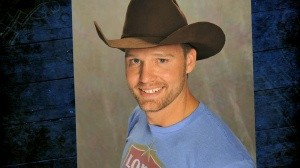
We're also introduced to a few men on the other end of the spectrum--Mark proudly shows off his "sissy" tattoo, and notes that his femininity sometimes sparks a violent reaction in some straight men. He constantly worries for his safety, and was harassed by schoolmates while growing up. Trevor faced the same ridicule, which caused him to eventually shut down before deciding to be "all the faggot that I could be." He notes that the same tactic he used to toughen up has resulted in an internal negativity within his own community; he now finds himself questioning his "inner bitch" and hoping to shed the mask he was forced to wear when younger.

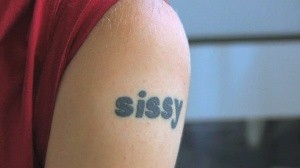
Those two subjects provide a necessary balance in Butch, which spends the majority of time exploring more stereotypically masculine subjects. But the film tries to point out that the definition of a man is broader than some of its own subjects might be willing to admit, a point beautifully articulated by psychologist Gregory Cason: "I often look at the people who are more feminine and cannot hide it as the ones who really learn early what it is to be a man. If they don't have sports ability, they can't pass [for straight]; if they don't have a masculine voice, they can't pass. So they're gonna be the ones who are subject to bullying, they're gonna be the ones who are marginalized--and they learn what it is to stand alone and be strong."
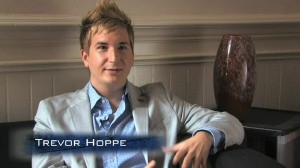
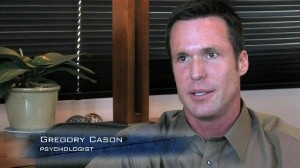
I was surprised that not as many of the men interviewed here addressed that dichotomy; while a few briefly touch upon it, you get the sense from some that the so-called "nellies" give gay men a bad reputation. But it's also the loud and proud flag wavers that are getting things done in society, waging the war to help us all have equal rights--something I wish a few guys acknowledged.
Jack Malebranche is the author of Androphilia: Rejecting the Gay Identity, Reclaiming Masculinity, a book that divided many in the community. "Mainstream gay culture is a celebration of fashion [and] the kind of music that 14-year-old girls listen to...it's the kind of things that housewives would like. It's not something that you associate with men," he says, noting that as people become progressively involved in gay culture, "they just move further and further away from what it means to be a man. They become unable to relate to other men, and I think that's unhealthy." Agree or disagree with him, Malebranche provides some of the film's more memorable material, like his assertion that gay men have to work harder to earn the "masculine" card that straight men--no matter their demeanor--are automatically granted.
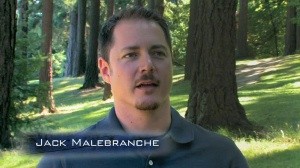
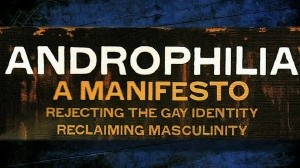
Another invaluable contributor is Don Romesburg, an archivist with the GLBT Historical Society who maintains an unbiased look at the issues. "What does 'masculine' mean? Who is masculine and who gets to determine what those traits are? Are they real or are they fetish? Or are they fashion?" Romesburg helps provide some perspective on the gay rights movement and the shifting views on gender roles, subjects that deserve their own documentary. They get short shrift here, but to be fair that isn't the film's purpose (although the quick clip of an old film warning about the dangers of predatory homosexuals is so terrible it's almost funny).
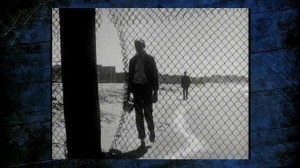
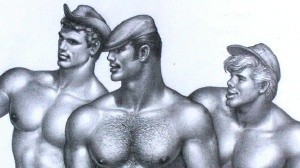
Other subjects include a female-to-male transsexual who provides a unique take on male privilege in society; writer Dan Cullinane, who address the femme-fearing social networking culture along with author John Campbell; singer/songwriter Brent Calderwood, who made headlines when he was 17; the rock band Ex-Boyfriends, still fighting to rid itself of the "gay band" label; USC professor Larry Gross, who delves into the origins of masculinity and femininity (and how those notions are linked to culture); and Robert Gordon, who relates a funny story about him and his bear buds.
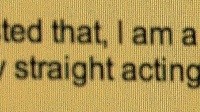
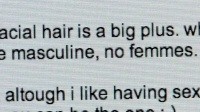
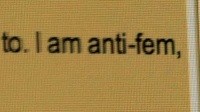
The film isn't as cohesive as it could be--all of the segments don't flow seamlessly together with a sense of purpose or structure (the documentary lags briefly just after the halfway point). The narration is mostly filler with general observations that don't offer anything truly thought-provoking. I wish there was more analysis of how the two main groups interact and view each other, and it's a shame that--for the most part--only the two stereotyped extremes are presented (what about all of the guys who aren't in sports leagues and aren't writing essays on queer theory?).
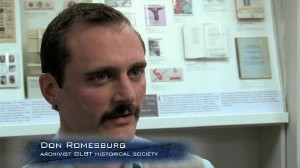
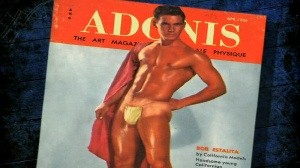
But The Butch Factor isn't meant to be anything more than a look into the lives of some very interesting people, and ultimately director Christopher Hines has made a wise decision to let them do most of the talking. While I fear most straight viewers--who may find this more interesting and illuminating than they would expect--probably won't see this, the documentary still relates an important message about the danger of stereotypes (which unfortunately is still a problem within the gay community).
All of these men have fascinating stories and observations to share, not just about their own lives but on how they stay true to themselves--proving that being a man means far more than having muscles and a deep voice. They're never boring, and their experiences are invaluable to gay men of any age. Whether you're young, impressionable and searching for role models or older, wiser and ready to embrace the challenge of becoming an even better man, The Butch Factor is an inspiring and important work.
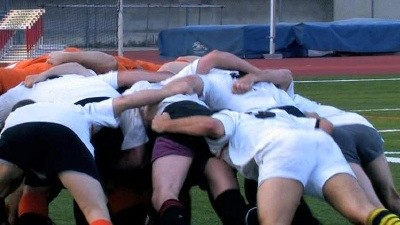
The DVD
Video:
The disc provided for this review was a screener, so I'll refrain from officially rating it's technical qualities. There were no problems with the anamorphic transfer, which suited the documentary just fine.
Audio:
Ditto the 2.0 audio track, which had clear dialogue throughout.
Extras:
This screener disc didn't have any extras (the opening minutes look like they could be the trailer), but the final product apparently has an interview with David Kopay, the first NFL player to come out of the closet.
Final Thoughts:
What does it mean to be gay and a man? What defines masculinity? This documentary peeks into a variety of lives to show that the answers aren't so simple--and that gay men face stereotypes not just from the straight world, but also from their own community. It's a simple premise, and while the material isn't as illuminating to gay people as it could be to straight viewers, just listening to these stories and theories makes for a fascinating watch. While The Butch Factor glosses over some intriguing ideas that deserve deeper exploration, that doesn't detract from the inspiring effort that shows how strength, courage and masculinity come in a variety of forms. Recommended.
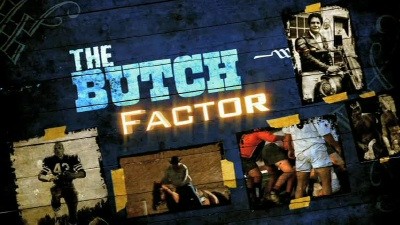
|
| Popular Reviews |
| Sponsored Links |
|
|
| Sponsored Links |
|
|
| Release List | Reviews | Shop | Newsletter | Forum | DVD Giveaways | Blu-Ray | Advertise |
|
Copyright 2024 DVDTalk.com All Rights Reserved. Legal Info, Privacy Policy, Terms of Use,
Manage Preferences,
Your Privacy Choices | |||||||









